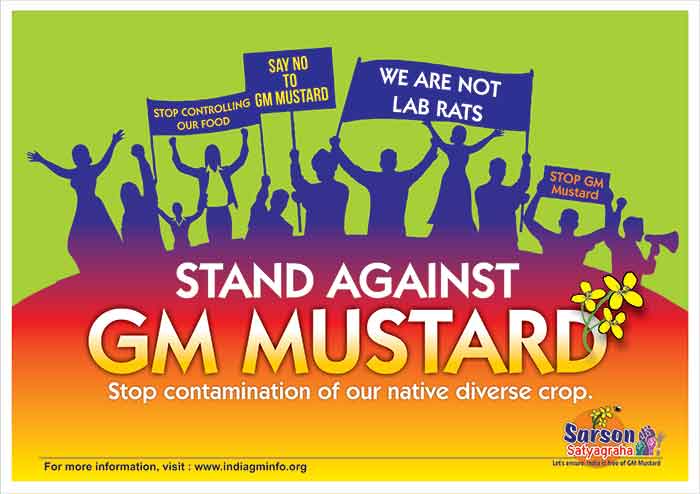
There is increasing and overwhelming evidence of the many-sided serious adverse impacts and dangers of GM (genetically modified) crops. To give an example, a review by eminent Indian scientist Dr. Pushpa M. Bhargava, who had earlier been appointed by the Supreme Court of India to advise on this issue, had revealed that almost all research papers on this subject that had no conflict of interest and had been authored by scientists of great integrity had been opposed to GM crops while at the same time almost all papers supporting GM crops had some conflict of interest. This was the situation found by him after millions of dollars had been poured by giant multinational companies to somehow manipulate scientific opinion in favor of GM crops which these companies and their collaborators want to use to dominate the world food and farming system.
In such a situation it is extremely disturbing to know that efforts are still being made by powerful interests to increase the testing of GM crops in a big way, ignoring the threat of genetic contamination for all normal crops as well. Despite the pressures being exerted for this by powerful interests and their collaborators, the state governments of Gujarat, Maharashtra and Telangana deserve to be congratulated for resisting some of the efforts being made for testing a new kind of transgenic cotton seed, as reported in media. However the challenge ahead is much bigger as powerful interests are striving relentlessly to get many sites at various places in the country get cleared for various GM crop trials even without having to get the approval of state governments. As a recent review in the Hindu by Jacob Koshy (The status of transgenic crops in India, June 15) has noted, “To resolve the question of States not according approvals on testing, because of differing attitudes on GM crops, the Genetic Engineering Appraisal Committee is considering a proposal by the Department of Biotechnology to declare some regions across India as ‘notified testing sites’. There are 42 such proposed sites and, if it goes through, companies wanting to conduct trials of GM crops at these locations won’t need the permission of States for trials.”
If this happens, this would be extremely dangerous for Indian agriculture, food safety and health. This also ignores the most important fact that GM crops are inherently dangerous, unstable, unreliable and harmful, something that has been repeatedly confirmed by scientific research. Their risks and dangers have further increased in times of climate change.
In 1994 several scientists involved in studying the implications and impacts of genetic engineering got together at the International Conference on ‘Redefining of Life Sciences’ organized at Penang, Malaysia, by the Third World Network. They issued a statement (the Penang Statement, or PS) which questioned the scientific basis of genetic engineering. This statement said :
“The new biotechnology based upon genetic engineering makes the assumption that each specific feature of an organism is encoded in one or a few specific, stable genes, so that the transfer of these genes results in the transfer of a discrete feature. This extreme form of genetic reductionism has already been rejected by the majority of biologists and many other members of the intellectual community because it fails to take into account the complex interactions between genes and their cellular, extracellular and external environments that are involved in the development of all traits.
“It has thus been impossible to predict the consequences of transferring a gene from one type of organism to another in a significant number of cases. The limited ability to transfer identifiable molecular characteristics between organisms through genetic engineering does not constitute the demonstration of any comprehensive or reliable system for predicting all the significant effects of transposing genes.”
In a widely quoted paper titled ‘The Biotechnology Bubble’ Dr. Mae-Wan Ho ( Bio-Electrodynamics lab of the Open University in the UK), Joe Cummins (Professor Emeritus of Genetics in Canada) and Hartmut Meyer have summarized the results of several experiments, trials and commercial releases of GMOs ( Genetically Modified Organisms). They write : “There are many signs of the problems caused in genetic engineering organisms. For every product that reaches the market, there are perhaps 20 or more that fail. It is particularly disastrous for animal welfare.
The authors of this widely quoted paper (published in the Ecologist) concluded : “It is important to realize that the failures are not just teething problems. They are very much the result of a reductionist science and a hit or miss technology. The transgenic foods created are unwholesome, because they involve stressing the developmental and metabolic system of organisms out of balance. There are bound to be unintended effects including toxins and allergens, which current risk assessments are designed to conceal rather than reveal. The major problem is the instability of transgenic lines.”
The Independent Science Panel (ISP) is a panel of scientists from many disciplines and countries, committed to the promotion of science for the public good. In a document titled ‘The case for a GMO-free Sustainable World’ the ISP has stated, “By far the most insidious dangers of genetic engineering are inherent to the process itself, which greatly enhances the scope and probability of horizontal gene transfer and recombination, the main route to creating viruses and bacteria that cause disease epidemics. This was highlighted, in 2001, by the ‘accidental’ creation of a killer mouse virus in the course of an apparently innocent genetic engineering experiment. Newer techniques, such as DNA shuffling, are allowing geneticists to create in a matter of minutes in the laboratory millions of recombinant viruses that have never existed in billions of years of evolution. Disease-causing viruses and bacteria and their genetic material are the predominant materials and tools for genetic engineering, as much as for the intentional creation of bio-weapons.”
In 2009, 17 distinguished scientists from Europe, USA, Canada and New Zealand wrote to the Prime Minister of India warning against “the unique risks (of GM crops) to food security, farming systems and bio-safety impacts which are ultimately irreversible.” This letter adds, “The GM transformation process is highly mutagenic leading to disruptions to host plant genetic structure and function, which in turn leads to disturbances in the biochemistry of the plant. This can lead to novel toxin and allergen production as well as reduced/altered nutrition quality.”
Marcello Buiatti (Plants Genetics Dept., University of Florence), has concluded in an essay, “GMOs-Facts and Fiction, “Far from being the new science, which will solve all the problems of humanity in a short time, present day genetic engineering is based on obsolete knowledge and an equally obsolete and wrong conception of life.”
Cesare Gessler,(The ETH Swiss Federal Institute of Technology), has stated,“ We use genes, which are foreign to a species, not knowing where they are inserted or what else will change in the whole chain from gene to protein.”
Dr. Peter Wills, theoretical biologist, Auckland University, has stated, “By transferring genes across species barriers, which have existed for aeons between species like humans and sheep, we risk breaching natural thresholds against unexpected biological processes. For example, an incorrectly folded form of an ordinary cellular protein can under certain circumstances be replicative and give rise to infectious neurological disease.”
The Independent Science Panel has said in its conclusion after examining all aspects of GM crops – “GM crops have failed to deliver the promised benefits and are posing escalating problems on the farm. Transgenic contamination is now widely acknowledged to be unavoidable, and hence there can be no co-existence of GM and non-GM agriculture. Most important of all, GM crops have not been proven safe. On the contrary, sufficient evidence has emerged to raise serious safety concerns, that if ignored could result in irreversible damage to health and the environment. GM crops should be firmly rejected now.”
Keeping in view these serious problems and dangers inherent in all GM crops, it is important to avoid these entirely. There is therefore no justification at all for facilitating and assisting companies to fulfill their profit and control maximizing agenda by throwing open the sacred earth of India for their trials which inherently also carry the danger of transgenic contamination of normal crops.
Bharat Dogra is Honorary Coordinator, Campaign to Save Earth Now. His recent books include Planet in Peril, Protecting Earth for Children and India’s Quest for Sustainable Farming and Healthy Food.














































